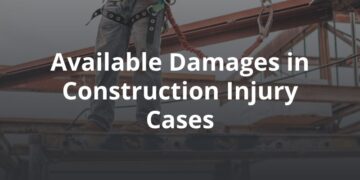When you’ve been in a car accident, it can be easy to dismiss a nagging pain in your neck. But if you choose to ignore it, that nagging pain can turn into chronic pain that leaves you immobilized.
Cervical radiculopathy, commonly the result of a pinched nerve or disc herniation in the neck, is a very common injury sustained in a car accident. Even a minor accident like a fender bender can result in whiplash that causes permanent trauma to your neck. More major impacts can cause even more trauma and damage to your cervical spine.
When you are involved in any type of car accident, it’s important to keep an eye out for the symptoms of cervical radiculopathy and get immediate medical attention, along with diagnostic imaging of your injury. And while it may not be the first thing you think of, it’s also important to contact a car accident attorney near you to make sure you have all the documentation you will need to make sure you do not get taken advantage of by an insurance company.
What Is Cervical Radiculopathy?
Cervical radiculopathy is very common in car accidents. It’s frequently a symptom of an injury to an intervertebral disc in your cervical spine in your neck.
When you have a disc herniation or other disc injury, either the jelly inside your discs (known to medical professionals as nucleus pulposus) or the actual disc material ruptures or bulges. This material can make contact with a nerve in your spine and pinch it, resulting in pain that radiates to your arms, neck, back, upper shoulders, and even your hands.
While your body might naturally recover from cervical radiculopathy, it may also indicate a very serious injury that can last and nag for many years. That’s why getting prompt medical care is so important. Whether you search your symptoms online and suspect you have a disc herniation or receive an official diagnosis from your doctor, our accident lawyers in Austin, Texas, can help you figure out the next steps in recovering your losses from your car accident injury.
Symptoms of Cervical Radiculopathy
The symptoms of cervical radiculopathy vary depending on the nature of your injury, but can include:
- Numbness
- Tingling
- Burning sensation
- Severe stiffness and loss of range of motion
- Aching
- Other types of pain
- Lack of feeling in your arms, hands, or shoulder blades
- Muscle weakness
It’s not uncommon to feel the symptoms somewhere in your body other than where the actual injury occurred. For instance, you may hit your head on the side of the door in an accident but start to notice you can’t feel your fingers. This can indicate a pinched nerve in your cervical spine.
You may also experience the symptoms immediately or not notice them for days — or even weeks — after your injury. That’s why we recommend that you get medical care and contact an accident attorney near you immediately after your accident.
What Treatments Might I Need?
Just like symptoms vary, the treatments you might need for cervical radiculopathy are individualized to you. The type of treatment you need depends on the level of damage and pain you experience.
Around 80 percent of people recover from cervical radiculopathy either on their own or with conservative care. In many cases, your body naturally heals or improves with treatments like physical therapy.
Depending on your level of pain, you may need pain management like oral steroids or epidural steroid injections that decrease inflammation. While this technique often provides temporary relief, you’ll likely need repeated courses of treatment either in the short term or for the rest of your life.
Surgery for Cervical Radiculopathy
In serious cases, you may need surgery to resolve your pain. Through a procedure known as a discectomy, your herniated disc is removed so there’s no longer any material that can put pressure on the nerve. Your vertebrae may be fused using a bone graft and hardware like rods and screws to keep your spine stable. Alternatively, a less invasive procedure called a microdiscectomy removes only a portion of the affected disc.
While surgery typically resolves your injury, it can take a long time for your nerves to regenerate and your symptoms to completely disappear. And if your bones don’t properly fuse, you may need future surgeries to correct it. The success of your surgery often depends on your individual anatomy and your health history.
How Can I Prove the Car Accident Caused My Injuries?
The best way to prove that a car accident caused your pinched nerve or herniated disc is to see a doctor and get diagnostic imaging like X-rays and an MRI immediately after your accident. A qualified doctor can help identify the issue and help establish if the car accident caused your injury. The longer you wait, the more difficult it may be to prove.
There’s a chance that your cervical discs were already starting to degenerate from normal wear and tear through aging but you never had any symptoms. A qualified medical professional may be able to show that you would have remained asymptomatic if you hadn’t been involved in a car accident, so you can possibly recover full damages for your injury.
It’s important that you’re diligent about getting medical care and proactive about your healing. In many instances, prevailing in a court case means showing that you worked on alleviating your symptoms under the care of a medical professional. If you’re in extreme pain and choose to ignore it, you risk not being awarded damages.
What Type of Damages Can I Receive?
If your injury was caused by another person’s negligence, you can legally seek damages. The amount of compensation you may be able to recover depends on things like the severity of your injury, any underlying conditions, and how much medical treatment you received.
Damages you can potentially receive in a car accident settlement include:
- Medical expenses, including diagnostic imaging
- Pain and suffering
- Disability
- Lost income
- Lost future earnings
Be sure to keep receipts and documentation from any medical appointment or procedure you have as a result of your injury.
What You Should Do After a Car Accident
If you’ve had an injury caused by a car accident, it’s important to get quick treatment. If you have any symptoms at all, whether of cervical radiculopathy or otherwise, you should get evaluated by a medical professional and document your injury.
Just as important as visiting a doctor is contacting a car accident attorney near you who can help you get the diagnostic imaging and treatment you need. Often, going through your health insurance to find a doctor means delays in critical diagnostic testing. Our team of accident lawyers in Austin, Texas, may be able to recommend medical professionals to evaluate your injury.
Not only will this give you the best chance at recovery, but you’ll preserve extremely important evidence for your lawsuit. You’ll also have the greatest chance of showing that your injuries were directly caused by the car accident.
Schedule a Free Consultation with FVF
When you’ve been injured in a car accident, we want to make sure you get the treatment and recovery you need as soon as possible. Contact our car accident lawyers in Austin, Texas, for a free consultation today.







